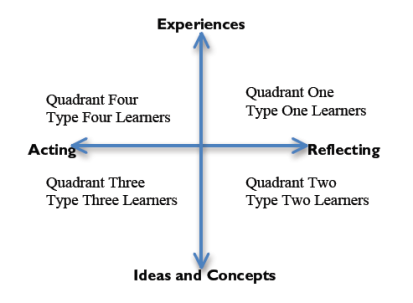4MAT Learning Styles Info
What are Learning Styles?
Learning Styles are the unique ways people perceive (take-in) and process (transform) knowledge, information and experience. They are the different ways that people take towards process of learning,
What is the basis of the 4MAT Learning Styles?
We perceive information on a continuum from feeling (12 o’clock) to thinking (6 o’clock). And we process (Transform) information on a continuum from reflecting (3 o’clock) to acting (9 o’clock).
The combination of these two dimensions forms the foundation of how people learn. This overlay results in four major learning styles, all of which are equally valuable.
 People have preferences for perceiving and processing information.
People have preferences for perceiving and processing information.
Those who prefer…
• Feeling and Reflecting are very comfortable in Quadrant One.
• Reflecting and Thinking are very comfortable in Quadrant Two.
• Thinking and Acting are very comfortable in Quadrant Three.
• Acting and Feeling are very comfortable in Quadrant Four.
The movement from Feeling to Reflecting is about motivating or values.
The movement from Thinking to Reflecting is about understanding or ideas
The movement from Thinking to Acting is about putting ideas into action
And the movement from Acting to Feeling is about creative adaptation or transfer.
Does it Help People to Know Their Own Learning Preferences?
We have seen great value in having people understand how they approach the learning process. Here are the most frequently cited benefits:
- self awareness
- understanding how to learn better
- understanding different approaches to motivating and communicating, and
- understanding how to become more adept at learning transfer and retention
What Researchers Contributed to the 4MAT Model?
While there are a number of different fields of research on learning styles, About Learning believes there are four major learning types, and these are based on the overlay of the perceiving and processing dimension. This research is rooted in the work of Kurt Lewin, David Kolb, John Dewey, Jean Claude Piaget, David Kolb, Carl Jung, Michael Polanyi, Isabel Meyers, Alfred North Whitehead, and Lev Vygotsky.


You must be logged in to post a comment.